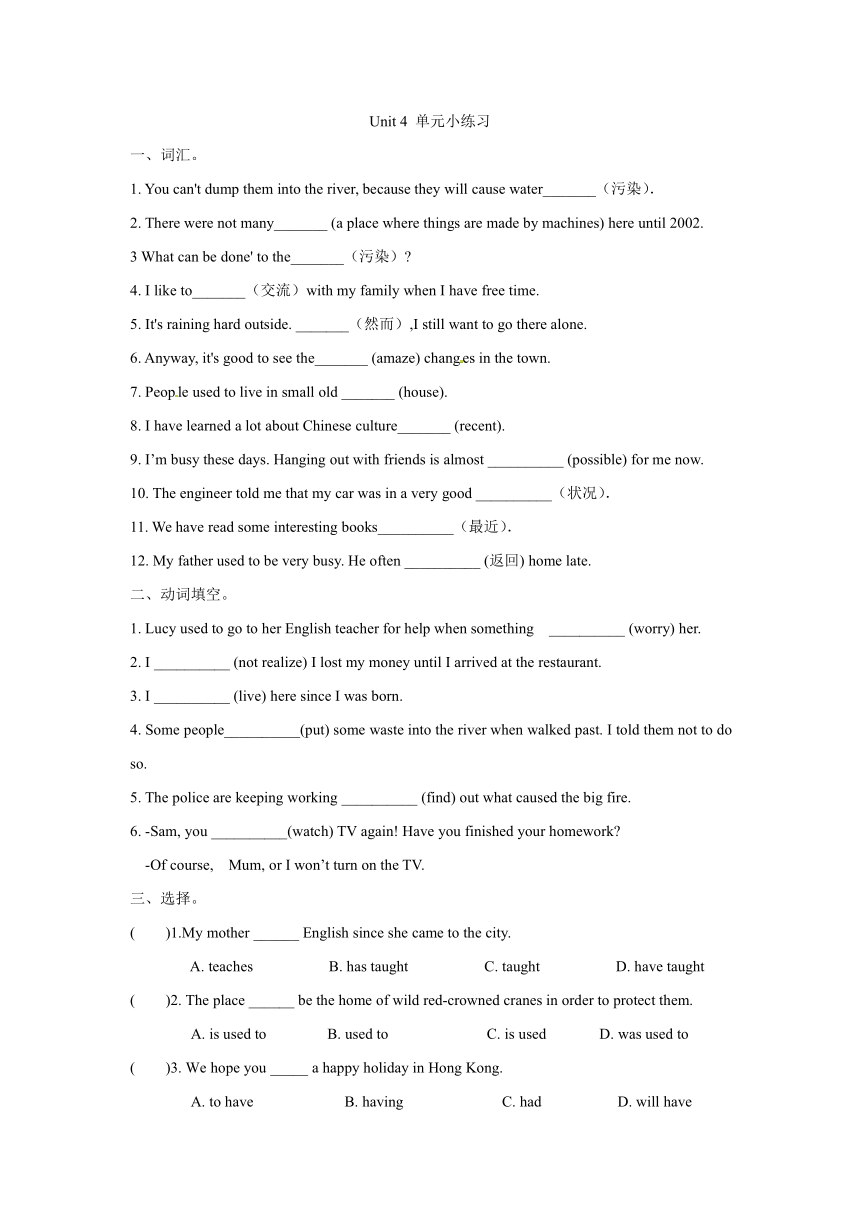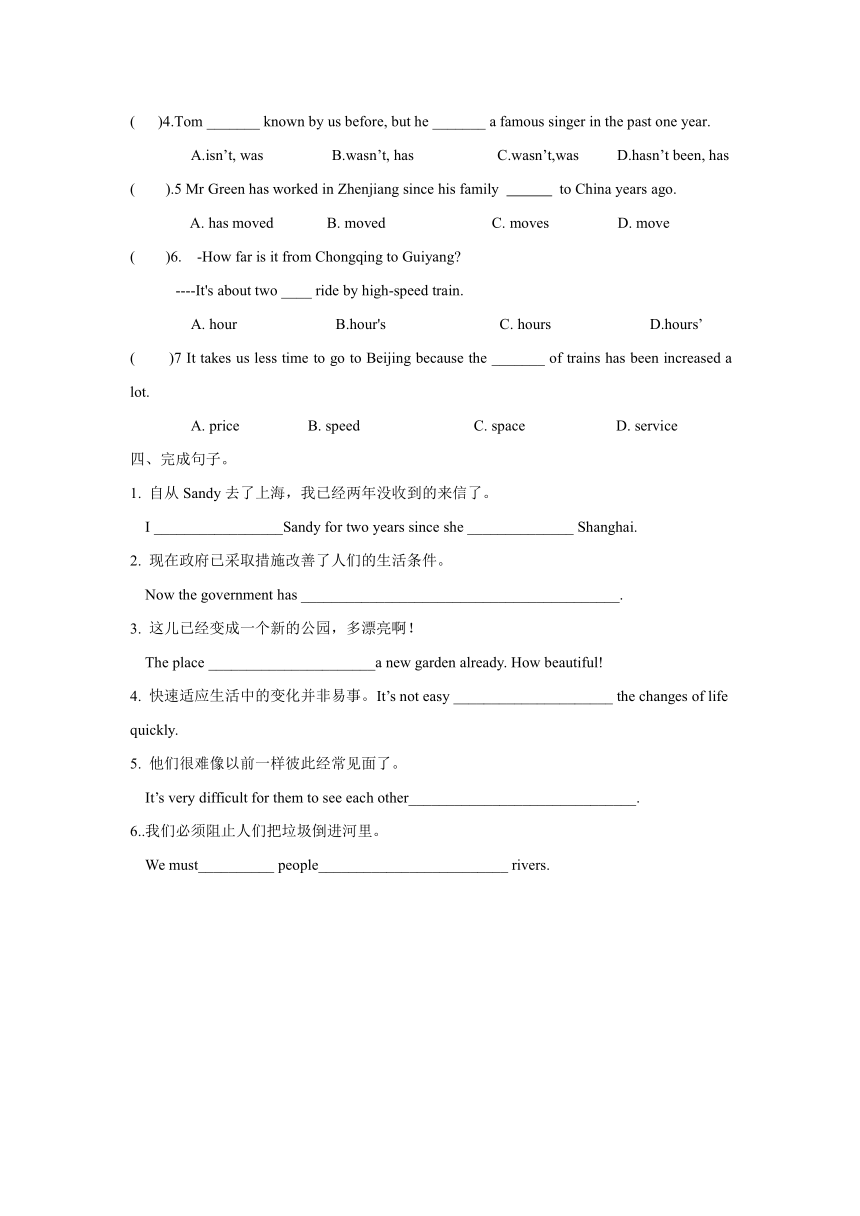Unit 4 A good read 单元小练习(含答案) 2024-2025学年牛津译林版八年级英语下册
文档属性
| 名称 | Unit 4 A good read 单元小练习(含答案) 2024-2025学年牛津译林版八年级英语下册 |

|
|
| 格式 | docx | ||
| 文件大小 | 32.3KB | ||
| 资源类型 | 教案 | ||
| 版本资源 | 牛津译林版 | ||
| 科目 | 英语 | ||
| 更新时间 | 2025-02-12 20:12:05 | ||
图片预览



文档简介
Unit 4 单元小练习
词汇。
1. You can't dump them into the river, because they will cause water_______(污染).
2. There were not many_______ (a place where things are made by machines) here until 2002.
3 What can be done' to the_______(污染)
4. I like to_______(交流)with my family when I have free time.
5. It's raining hard outside. _______(然而),I still want to go there alone.
6. Anyway, it's good to see the_______ (amaze) changes in the town.
7. People used to live in small old _______ (house).
8. I have learned a lot about Chinese culture_______ (recent).
9. I’m busy these days. Hanging out with friends is almost __________ (possible) for me now.
10. The engineer told me that my car was in a very good __________(状况).
11. We have read some interesting books__________(最近).
12. My father used to be very busy. He often __________ (返回) home late.
动词填空。
1. Lucy used to go to her English teacher for help when something __________ (worry) her.
2. I __________ (not realize) I lost my money until I arrived at the restaurant.
3. I __________ (live) here since I was born.
4. Some people__________(put) some waste into the river when walked past. I told them not to do so.
5. The police are keeping working __________ (find) out what caused the big fire.
6. -Sam, you __________(watch) TV again! Have you finished your homework
-Of course, Mum, or I won’t turn on the TV.
选择。
( )1.My mother ______ English since she came to the city.
A. teaches B. has taught C. taught D. have taught
( )2. The place ______ be the home of wild red-crowned cranes in order to protect them.
A. is used to B. used to C. is used D. was used to
( )3. We hope you _____ a happy holiday in Hong Kong.
A. to have B. having C. had D. will have
( )4.Tom _______ known by us before, but he _______ a famous singer in the past one year.
A.isn’t, was B.wasn’t, has C.wasn’t,was D.hasn’t been, has
( ).5 Mr Green has worked in Zhenjiang since his family to China years ago.
A. has moved B. moved C. moves D. move
( )6. -How far is it from Chongqing to Guiyang
----It's about two ____ ride by high-speed train.
A. hour B.hour's C. hours D.hours’
( )7 It takes us less time to go to Beijing because the _______ of trains has been increased a lot.
A. price B. speed C. space D. service
完成句子。
1. 自从Sandy去了上海,我已经两年没收到的来信了。
I _________________Sandy for two years since she ______________ Shanghai.
2. 现在政府已采取措施改善了人们的生活条件。
Now the government has __________________________________________.
3. 这儿已经变成一个新的公园,多漂亮啊!
The place ______________________a new garden already. How beautiful!
4. 快速适应生活中的变化并非易事。It’s not easy _____________________ the changes of life quickly.
5. 他们很难像以前一样彼此经常见面了。
It’s very difficult for them to see each other______________________________.
6..我们必须阻止人们把垃圾倒进河里。
We must__________ people_________________________ rivers.
一、词汇
pollution
解析:“cause water pollution” 表示 “造成水污染”,“pollution” 是名词,意为 “污染”。
factories
解析:根据英文释义 “a place where things are made by machines” 可知是 “工厂”,“factory”,由 “many” 可知用复数形式 “factories”。
pollution
解析:“the pollution” 指 “污染问题”,用名词形式。
communicate
解析:“like to do sth.” 表示 “喜欢做某事”,“communicate with” 是 “和…… 交流” 的意思。
However
解析:“however” 意为 “然而”,通常用逗号与句子隔开。
amazing
解析:“amazing” 常用来修饰物,表示 “令人惊奇的”,这里修饰 “changes”。
houses
解析:“people” 是复数,他们过去住的房子也不止一个,所以用 “house” 的复数形式 “houses”。
recently
解析:“recently” 是副词,意为 “最近”,在句中作时间状语。
impossible
解析:根据 “I’m busy these days.” 可知现在和朋友出去玩几乎是 “不可能的”,“possible” 的反义词是 “impossible”。
condition
解析:“in a very good condition” 表示 “处于非常好的状况”。
recently
解析:“recently” 用于现在完成时的句子中,作时间状语。
returned
解析:“used to” 表示过去常常做某事,句子时态为一般过去时,“return” 的过去式是 “returned”。
二、动词填空
worried
解析:“used to do sth.” 表示过去常常做某事,句子时态为一般过去时,“worry” 的过去式是 “worried”。
didn't realize
解析:“until I arrived at the restaurant” 表明主句时态为一般过去时,“realize” 是实义动词,否定句要借助助动词 “didn't”,动词还原为原形。
have lived
解析:“since I was born” 是现在完成时的标志,结构是 “have/has + 过去分词”,主语是 “I”,用 “have”,“live” 的过去分词是 “lived”。
were putting
解析:根据 “when walked past” 可知,当 “我” 路过的时候,一些人正在往河里倒垃圾,用过去进行时,结构是 “was/were + 现在分词”,主语是 “Some people”,用 “were”,“put” 的现在分词是 “putting”。
to find
解析:“警察一直工作” 的目的是 “查明是什么导致了这场大火”,用动词不定式作目的状语。
are watching
解析:根据语境可知妈妈看到 Sam 正在看电视,用现在进行时,结构是 “be + 现在分词”,主语是 “you”,用 “are”,“watch” 的现在分词是 “watching”。
三、选择
答案:B
解析:“since she came to the city” 是现在完成时的标志,结构是 “have/has + 过去分词”,主语是 “My mother”,用 “has”,“teach” 的过去分词是 “taught”,故选 B。
答案:B
解析:“used to do sth.” 表示过去常常做某事,这里指这个地方过去是野生丹顶鹤的家园;“be used to do sth.” 表示 “被用来做某事”;“be used to doing sth.” 表示 “习惯于做某事”,根据语境选 B。
答案:D
解析:“hope” 不能用 “hope sb. to do sth.” 的结构,“hope + (that)从句” 表示 “希望……”,根据语境可知是希望对方将来在香港度过一个愉快的假期,用一般将来时,故选 D。
答案:B
解析:“before” 表明前半句用一般过去时,“Huo Zun” 和 “know” 是被动关系,即 “Tom以前不被我们所熟知”,用 “wasn't known”;“in the past one year” 是现在完成时的标志,后半句用现在完成时,“become” 的过去分词是 “become”,故选 B。
答案:B
解析:“since” 引导的时间状语从句,从句用一般过去时,主句用现在完成时,“years ago” 是过去时间,从句动词用过去式 “moved”,故选 B。
答案:D
解析:“two hours” 表示两个小时,“two hours’ ride” 表示 “两小时的车程”,用名词所有格形式,故选 D。
答案:B
解析:根据 “It takes us less time to go to Beijing” 可知是火车的 “速度” 提高了很多,“speed” 意为 “速度”,故选 B。
四、完成句子
haven't heard from; went to
解析:“hear from sb.” 表示 “收到某人的来信”,“since” 引导的时间状语从句,从句用一般过去时,主句用现在完成时,“go to Shanghai” 用过去式 “went to Shanghai”,“I” 作主语,现在完成时用 “haven't + 过去分词”。
taken measures to improve people's living conditions
解析:“take measures to do sth.” 表示 “采取措施做某事”,“improve people's living conditions” 表示 “改善人们的生活条件”,“has” 后接动词的过去分词 “taken”。
has turned into
解析:“turn into” 表示 “变成”,“already” 是现在完成时的标志,主语是 “The place”,用 “has + 过去分词”,“turn” 的过去分词是 “turned”。
to get used to
解析:“It’s + 形容词 + to do sth.” 是固定句型,“get used to” 表示 “适应”。
as often as before
解析:“as... as...” 表示 “和…… 一样”,“as often as before” 表示 “像以前一样经常”。
stop; from pouring waste into
解析:“stop sb. from doing sth.” 表示 “阻止某人做某事”,“pour waste into rivers” 表示 “把垃圾倒进河里”。
词汇。
1. You can't dump them into the river, because they will cause water_______(污染).
2. There were not many_______ (a place where things are made by machines) here until 2002.
3 What can be done' to the_______(污染)
4. I like to_______(交流)with my family when I have free time.
5. It's raining hard outside. _______(然而),I still want to go there alone.
6. Anyway, it's good to see the_______ (amaze) changes in the town.
7. People used to live in small old _______ (house).
8. I have learned a lot about Chinese culture_______ (recent).
9. I’m busy these days. Hanging out with friends is almost __________ (possible) for me now.
10. The engineer told me that my car was in a very good __________(状况).
11. We have read some interesting books__________(最近).
12. My father used to be very busy. He often __________ (返回) home late.
动词填空。
1. Lucy used to go to her English teacher for help when something __________ (worry) her.
2. I __________ (not realize) I lost my money until I arrived at the restaurant.
3. I __________ (live) here since I was born.
4. Some people__________(put) some waste into the river when walked past. I told them not to do so.
5. The police are keeping working __________ (find) out what caused the big fire.
6. -Sam, you __________(watch) TV again! Have you finished your homework
-Of course, Mum, or I won’t turn on the TV.
选择。
( )1.My mother ______ English since she came to the city.
A. teaches B. has taught C. taught D. have taught
( )2. The place ______ be the home of wild red-crowned cranes in order to protect them.
A. is used to B. used to C. is used D. was used to
( )3. We hope you _____ a happy holiday in Hong Kong.
A. to have B. having C. had D. will have
( )4.Tom _______ known by us before, but he _______ a famous singer in the past one year.
A.isn’t, was B.wasn’t, has C.wasn’t,was D.hasn’t been, has
( ).5 Mr Green has worked in Zhenjiang since his family to China years ago.
A. has moved B. moved C. moves D. move
( )6. -How far is it from Chongqing to Guiyang
----It's about two ____ ride by high-speed train.
A. hour B.hour's C. hours D.hours’
( )7 It takes us less time to go to Beijing because the _______ of trains has been increased a lot.
A. price B. speed C. space D. service
完成句子。
1. 自从Sandy去了上海,我已经两年没收到的来信了。
I _________________Sandy for two years since she ______________ Shanghai.
2. 现在政府已采取措施改善了人们的生活条件。
Now the government has __________________________________________.
3. 这儿已经变成一个新的公园,多漂亮啊!
The place ______________________a new garden already. How beautiful!
4. 快速适应生活中的变化并非易事。It’s not easy _____________________ the changes of life quickly.
5. 他们很难像以前一样彼此经常见面了。
It’s very difficult for them to see each other______________________________.
6..我们必须阻止人们把垃圾倒进河里。
We must__________ people_________________________ rivers.
一、词汇
pollution
解析:“cause water pollution” 表示 “造成水污染”,“pollution” 是名词,意为 “污染”。
factories
解析:根据英文释义 “a place where things are made by machines” 可知是 “工厂”,“factory”,由 “many” 可知用复数形式 “factories”。
pollution
解析:“the pollution” 指 “污染问题”,用名词形式。
communicate
解析:“like to do sth.” 表示 “喜欢做某事”,“communicate with” 是 “和…… 交流” 的意思。
However
解析:“however” 意为 “然而”,通常用逗号与句子隔开。
amazing
解析:“amazing” 常用来修饰物,表示 “令人惊奇的”,这里修饰 “changes”。
houses
解析:“people” 是复数,他们过去住的房子也不止一个,所以用 “house” 的复数形式 “houses”。
recently
解析:“recently” 是副词,意为 “最近”,在句中作时间状语。
impossible
解析:根据 “I’m busy these days.” 可知现在和朋友出去玩几乎是 “不可能的”,“possible” 的反义词是 “impossible”。
condition
解析:“in a very good condition” 表示 “处于非常好的状况”。
recently
解析:“recently” 用于现在完成时的句子中,作时间状语。
returned
解析:“used to” 表示过去常常做某事,句子时态为一般过去时,“return” 的过去式是 “returned”。
二、动词填空
worried
解析:“used to do sth.” 表示过去常常做某事,句子时态为一般过去时,“worry” 的过去式是 “worried”。
didn't realize
解析:“until I arrived at the restaurant” 表明主句时态为一般过去时,“realize” 是实义动词,否定句要借助助动词 “didn't”,动词还原为原形。
have lived
解析:“since I was born” 是现在完成时的标志,结构是 “have/has + 过去分词”,主语是 “I”,用 “have”,“live” 的过去分词是 “lived”。
were putting
解析:根据 “when walked past” 可知,当 “我” 路过的时候,一些人正在往河里倒垃圾,用过去进行时,结构是 “was/were + 现在分词”,主语是 “Some people”,用 “were”,“put” 的现在分词是 “putting”。
to find
解析:“警察一直工作” 的目的是 “查明是什么导致了这场大火”,用动词不定式作目的状语。
are watching
解析:根据语境可知妈妈看到 Sam 正在看电视,用现在进行时,结构是 “be + 现在分词”,主语是 “you”,用 “are”,“watch” 的现在分词是 “watching”。
三、选择
答案:B
解析:“since she came to the city” 是现在完成时的标志,结构是 “have/has + 过去分词”,主语是 “My mother”,用 “has”,“teach” 的过去分词是 “taught”,故选 B。
答案:B
解析:“used to do sth.” 表示过去常常做某事,这里指这个地方过去是野生丹顶鹤的家园;“be used to do sth.” 表示 “被用来做某事”;“be used to doing sth.” 表示 “习惯于做某事”,根据语境选 B。
答案:D
解析:“hope” 不能用 “hope sb. to do sth.” 的结构,“hope + (that)从句” 表示 “希望……”,根据语境可知是希望对方将来在香港度过一个愉快的假期,用一般将来时,故选 D。
答案:B
解析:“before” 表明前半句用一般过去时,“Huo Zun” 和 “know” 是被动关系,即 “Tom以前不被我们所熟知”,用 “wasn't known”;“in the past one year” 是现在完成时的标志,后半句用现在完成时,“become” 的过去分词是 “become”,故选 B。
答案:B
解析:“since” 引导的时间状语从句,从句用一般过去时,主句用现在完成时,“years ago” 是过去时间,从句动词用过去式 “moved”,故选 B。
答案:D
解析:“two hours” 表示两个小时,“two hours’ ride” 表示 “两小时的车程”,用名词所有格形式,故选 D。
答案:B
解析:根据 “It takes us less time to go to Beijing” 可知是火车的 “速度” 提高了很多,“speed” 意为 “速度”,故选 B。
四、完成句子
haven't heard from; went to
解析:“hear from sb.” 表示 “收到某人的来信”,“since” 引导的时间状语从句,从句用一般过去时,主句用现在完成时,“go to Shanghai” 用过去式 “went to Shanghai”,“I” 作主语,现在完成时用 “haven't + 过去分词”。
taken measures to improve people's living conditions
解析:“take measures to do sth.” 表示 “采取措施做某事”,“improve people's living conditions” 表示 “改善人们的生活条件”,“has” 后接动词的过去分词 “taken”。
has turned into
解析:“turn into” 表示 “变成”,“already” 是现在完成时的标志,主语是 “The place”,用 “has + 过去分词”,“turn” 的过去分词是 “turned”。
to get used to
解析:“It’s + 形容词 + to do sth.” 是固定句型,“get used to” 表示 “适应”。
as often as before
解析:“as... as...” 表示 “和…… 一样”,“as often as before” 表示 “像以前一样经常”。
stop; from pouring waste into
解析:“stop sb. from doing sth.” 表示 “阻止某人做某事”,“pour waste into rivers” 表示 “把垃圾倒进河里”。
